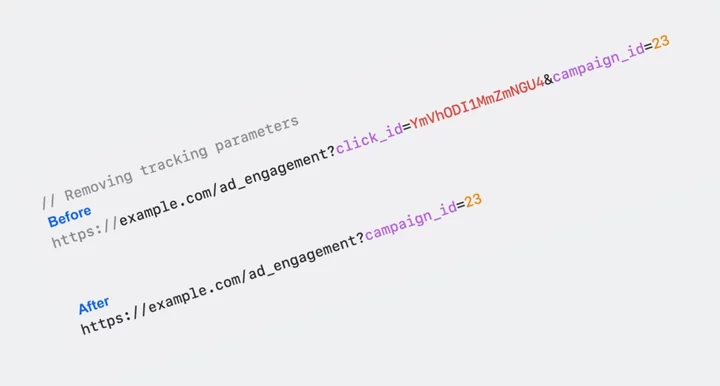Apple is taking aim at a tool the ad industry uses to monitor internet users by cracking down on “tracking parameters” from web links.
Users encounter tracking parameters on URLs from an ad campaign circulating on social media or over email. The URL can contain special text to help marketers confirm that users are clicking their links through a marketing campaign.
An example of a tracking parameterHowever, tracking parameters can also help the ad industry profile a user's web-browsing activity by indicating which sites they used to view and click on a marketing campaign. That privacy risk is causing Apple to take action.
“Some websites add extra information to their URLs in order to track users across other websites,” the company says. “Now this information will be removed from the links users share in Messages and Mail, and the links will still work as expected. This information will also be removed from links in Safari Private Browsing.”
Details about this “link tracking protection” are thin. But in a session at this week's Wordwide Developers Conference (WWDC), an Apple engineer said the parameter removal will happen in Safari’s Privacy Browsing mode as part of browser navigation, and when copying a link.
“When a tracking parameter is detected, Safari strips the identifying components of the URL, while leaving nonidentifiable parts intact,” said engineer Michael Hesse. The resulting feature sounds similar to how Mozilla’s Firefox also strips out URL tracking parameters.
Although the change may upset internet marketing firms, Hesse said they can still track ad performance through better approaches. "Remember that ad attribution can be done without identifying individuals across websites. For example, Private Click Measurement is a privacy-preserving alternative to tracking parameters for advertising attribution," he added.
It's also looks like the tracking parameter can still appear in marketing emails sent directly to a user. With Apple's approach, the tracking parameter is only removed during the sharing process within Messages and Mail.
The big question is whether Apple will expand the crackdown to all forms of tracking parameters, or if it’ll make certain exceptions. In the case of Firefox, the browser only removed the tracking parameters used by companies such as Facebook and Hubspot, but not by Google. A Firefox user also has to manually turn on the blocking by switching the browser’s Enhanced Tracking Protection from “Standard” to “Strict.”
Apple customers can expect the link tracking protection to arrive in iOS 17, iPadOS 17, and macOS Sonoma, which launch this fall.









